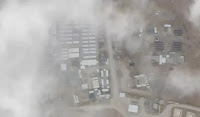That’s among the takeaways from the CEO of Hapag-Lloyd, the world’s No. 5 container line, in an interview Thursday on Bloomberg TV. Rolf Habben Jansen was speaking as the Hamburg, Germany-based company announced 2023 earnings that showed a steep drop in revenue and profits from a year earlier.
Houthi attacks on ships in the Red Sea have disrupted supply chains since mid-December 2023, forcing carriers to change routes and redo schedules — adjustments that have helped absorb excess capacity.
As a result, they’re burning more fuel and taking longer to deliver, with some needing to purchase more containers given the extended routes. The added costs are getting past along to customers.
The longer routes around southern Africa initially boosted spot container rates but those are coming down, Jansen said. “The services are stabilizing, which also means that the market is getting calmer.”
He indicated, though, that there’s no telling when the Red Sea will be safe enough to transit again.
“We hope that we’re going to be able to go back through in a couple of months,” Jansen said. “But I know there are also people that think that it will last quite a while longer.”
In the medium term, excess capacity may return to weigh on freight rates. Hapag-Lloyd expects the market to remain difficult for carriers given the large number of ship deliveries this year, Jansen said in the company’s 2023 annual report.
Sharing that view was Zim Integrated Shipping CEO Eli Glickman, who spoke on a conference call on Wednesday. “Once the Red Sea crisis is resolved, we will likely revert to the supply-demand scenario that began to play out in ‘23, setting up a more challenging third and fourth quarter of 2024 for the industry, including us,” he said.
It’s not just the shipping companies facing a tough environment. World Trade Organization Director-General Ngozi Okonjo-Iweala told Bloomberg in an interview that “the risks are all on the downside.”
But corporate supply chains have gotten more resilient and flexible. Here’s a rundown of comments that a few big shippers and a major port operator have offered this week:
Samsonite CFO Reza Taleghani: “So if you think about things you read about in the news, shipping delays, Red Sea, et cetera, we are just fine. We have inventory exactly where we need it to be. All of our facilities, even if there is a week or two delays, not that big of a deal.”
Adidas CEO Bjorn Gulden: “We have a little bit of headwind in freight in the first half because of the Red Sea situation, and as you know, if the freight companies have a chance to do something they increase prices. That should normalize and then the rest of everything that has to do with margin is going in the right direction.”
Williams-Sonoma CEO Laura Alber: “When a problem comes along, they’re real. The Red Sea disruption is pretty terrible. However, it is not costing us any more money. So far it is costing us about 10 days of delivery, give or take. And as I mentioned last time, we padded the deliveries to our customers once we heard about it, so we didn't disappoint them.”
DP World Group Chairman Sultan Ahmed bin Sulayem: “Despite the uncertain start to 2024 with the ongoing Red Sea crisis, our portfolio has continued to demonstrate resilience. The outlook remains uncertain due to the challenging geopolitical and economic environment.”



















